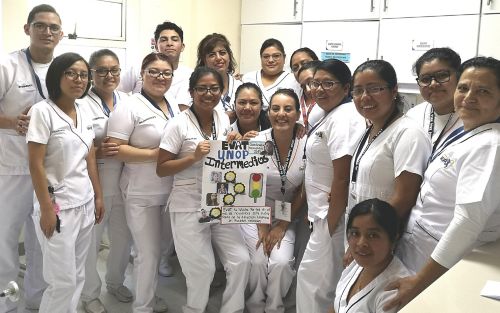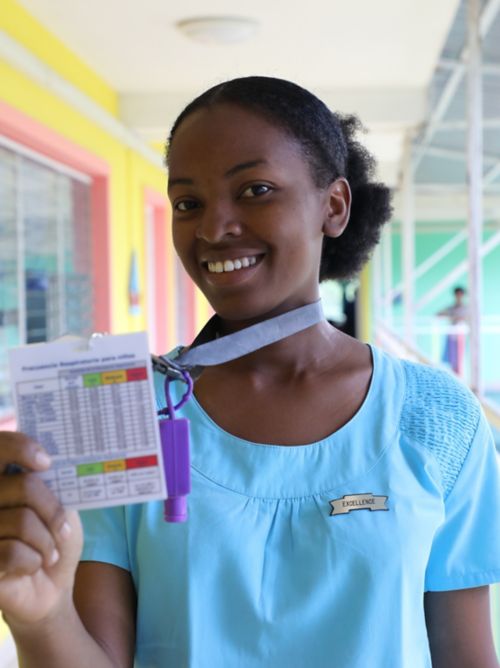St. Jude Family of Websites
Explore our cutting edge research, world-class patient care, career opportunities and more.
St. Jude Children's Research Hospital Home

- Fundraising
St. Jude Family of Websites
Explore our cutting edge research, world-class patient care, career opportunities and more.
St. Jude Children's Research Hospital Home

- Fundraising
Latin American hospitals implement tool to identify kids whose condition is deteriorating

At Unidad Nacional de Oncologia Pediatrica (UNOP) in Guatemala posters were used to promote the pediatric early warning system (PEWS).
Pediatric cancer centers in 13 Latin American countries have demonstrated that limited resources and a pandemic are not insurmountable barriers to quality improvement. St. Jude Children’s Research Hospital partnered with dozens of centers to implement a pediatric early warning system (PEWS) to help identify hospitalized children with cancer whose condition is deteriorating.
The effort is a first of its kind and offers lessons for establishing other programs to improve childhood cancer care and survival worldwide. The work appeared recently in the journal Cancer.
“This is the first multicenter, multinational study reporting a successful implementation strategy to scale-up a pediatric early warning system across a geographic region with resource-limited hospitals,” said Asya Agulnik, MD, MPH, St. Jude Global Critical Care Program director. Agulnik led the study.
Between April 2017 and October 2021, 36 hospitals across Latin America established a PEWS, including 13 during the pandemic. Eighteen months later the hospitals were still using the systems with a high level of accuracy. During that time, more than 11,100 nurses, doctors and other clinicians were trained to the early warning system. The method was used to improve the care of more than 41,000 hospitalized children with cancer.

A nurse at St. Damien Hospital in Haiti with one of the tools used to support adoption of a pediatric early warning system.
Quality improvement lessons learned
In the United States and other high-income countries, more than 80% of children diagnosed with cancer survive. But in low- and middle-income countries, where 90% of children with cancer are, survival is just 20%.
PEWS are nursing-administered bedside clinical assessment tools associated with a clinical action algorithm. They are proven to help staff quickly identify patient deterioration and intervene to improve outcomes. Deterioration is a common problem in hospitalized children with cancer and is associated with patient death rates of 30%. Despite an urgent need for effective, low cost and feasible supportive care interventions, PEWS are not widely used in resource-limited hospitals.
In 2017, St. Jude researchers and their Latin American partners created Proyecto Escala de Valoracion de Alerta Temprana (EVAT) to scale up PEWS regionally.
Factors that play a key role in their success included:
- Collecting pre-implementation data prior to launching PEWS to help hospitals define the problem of deterioration in their patients,
- Adapting education and training for each center,
- Maintaining a flexible and tailored implementation timetable,
- Tracking and evaluating implementation milestones,
- And, developing strong regional program leadership and mentoring.
Expanding strategy with and beyond Latin America
The regional PEWS implementation effort now includes 84 Latin American hospitals. Plans are to keep enrolling 10 to 15 new centers annually.
“The program we deliver for the current 2022 hospital cohort is very different than the program when we started,” Agulnik said.
“The way we got here was through regional leadership that’s been able to recognize what we are missing, what we need to do differently to implement the program and how to communicate with the centers,” she said. “They are the experts, not us.”
What has not changed, Agulnik said, is the need. St. Jude staff are now working with partners at pilot centers in Africa and Asia to not only adapt PEWS for those regions but streamline and speed up the implementation process.
“The goal is to promote widespread adoption of interventions to improve global outcomes for children with cancer and reduce disparities,” Agulnik said. “PEWS is just the start.”






